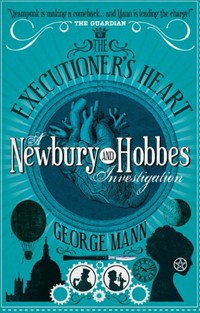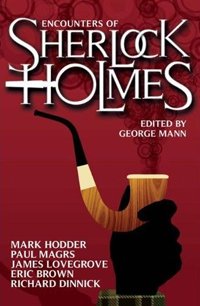History, horror, fantasy and mystery. It’s Victorian crime fiction but not as we know it in the books of George Mann. Released today, The Executioner’s Heart is the fourth in his Newbury & Hobbes series. In it, there’s a seriel killer stalking the streets of London and that’s more than Scotland Yard can handle. So they call in the very able Sir Maurice Newbury and Miss Veronica Hobbes. We invited the author over to tell us more about his brand of crime fiction…
First of all, can you give us a quick introduction to Newbury and Hobbes?
Of course! Sir Maurice Newbury and Miss Veronica Hobbes are both Crown investigators who work directly for Queen Victoria – albeit a crippled, decrepit version of Queen Victoria who’s being kept alive via a primitive life support system, and hidden away from the public. Newbury is one of Victoria’s favourites, and she relies on him to deal with any extraordinary threats to the Empire, be they technological or supernatural in origin. Newbury is obsessed with the occult and an unapologetic opium addict, much to the chagrin of his friends and colleagues. Despite that, he’s handy in a fistfight and adept with a swordstick, and his inquisitive mind and relentless approach to getting to the bottom of a mystery means he usually gets his man.
Veronica, ostensibly Newbury’s assistant but very much his equal, is a strong, forthright woman in a time when women were generally considered the weaker sex. She can more than hold her own in this oppressive world of men, and she’s often the one to pull Newbury out of a scrape. She has taken on responsibility for her sister, Amelia, who’s afflicted with an illness that causes her to suffer terrible clairvoyant seizures.
Together, these two go gallivanting about investigating strange crimes or undertaking missions for the Queen, all with the able help of Newbury’s friend, Chief Inspector Sir Charles Bainbridge, of Scotland Yard.
The books are set in Victorian London, but it’s not quite historically accurate. Why did you change it?
For me it’s all about creating a fantasy out of the past, and the freedom that offers you as a writer. I mean, even most accurate rendering of Victorian London in a novel is still a fantasy, of sorts, because the writer wasn’t there, and is conjuring that smokey, fog-bound city from their imagination, drawing on whatever sources are available. By changing things, allowing some more fantastical elements to creep in, you’re also adding mystery. The reader really doesn’t know what might happen next, or what’s possible in this weird and wonderful version of the world you’re describing, because it no longer reflects established history. If the monsters under the bed have been proved to be real, then suddenly, anything could happen.
Our review of The Executioner’s Heart will appear here very soon. Later in the summer you’re releasing The Revenant Express. Can you give us a sneak preview?
It picks up right where The Executioner’s Heart leaves off, with Newbury and Amelia boarding a massive transcontinental train bound for the icy fantasia of St Petersburg. There’s a very special object Newbury’s going there to retrieve, something directly related to the cliffhanger from the previous book. But the journey’s not going to be an easy one. First of all, there’s a very angry cultist from the Cabal of the Horned Beast out for Newbury’s blood. Then Amelia goes missing, presumed kidnapped, and to top it all, there’s an outbreak of plague revenants onboard the train!
You’ve been busy. There’s a short story anthology, The Casebook of Newbury & Hobbes, out in September. You also edited and contributed a story to the Encounters of Sherlock Holmes. What do you enjoy about short stories?
Oh, I love short stories, both as a reader and as a writer. The form is perfect for experimentation. With regards to Newbury and Hobbes, I’ve used the short stories to fill in some of the blanks between novels, or to explore aspects of some of the key characters – Newbury in particular. I really enjoyed writing The Dark Path, the new story that opens the Casebook, for instance. It features Newbury on an adventure with his previous assistant, Templeton Black. Black has been mentioned a few times, and even glimpsed as an hallucination in another short story, but this is the first time I’ve written about him properly, off on an investigation with Newbury, and it was a lot of fun exploring his dynamic with Newbury. I think short stories are perfect for that sort of thing, really.
You clearly enjoy mixing genres. There is crime, alternate history, fantasy and even a touch of horror in the books. Do you find sticking within one genre too restrictive or boring?
I don’t think I’ve ever purposefully set out to blend genres, but nor do I ever sit down to write within the conventions of a particular genre, either. I suppose I just follow the story, and go where my mood and influences take me. I don’t restrict myself to one genre because I don’t think it would be better for the books, and I don’t think I’d enjoy it half as much. I know it’s easier to market a book if the publishers know how to tell potential readers what it is – I’ve worked in bookselling and publishing long enough to understand and appreciate the commercial reality of it – but I also don’t want to feel that I can’t stray outside of that if the story would be better because of it. Story comes first.
Sherlock Holmes: The Will of the Dead is out in November. Can you tell us what to expect?
In many ways it’s quite a traditional Holmes story, but it’s also set early on in the Newbury & Hobbes universe, with Charles Bainbridge as one of the main characters, appearing here as a young inspector who has yet to properly make his name. The story begins with a visitor to Baker Street asking for Holmes’s help finding a missing will that, if not found, will be the cause of the man’s ruin. Holmes agrees to help, but soon finds himself drawn into a web of murder, lies and deceit, as the Maugham family turn out to have many, many secrets. Meanwhile, Bainbridge is investigating a series of robberies committed by ‘iron men’ – strange automata who burst into people’s homes to steal their jewellery. Hopefully Holmes fans will enjoy it, and Newbury & Hobbes readers will find some little references in there to enjoy, too.
Watch for our review of The Executioner’s Heart soon here on Crime Fiction Lover.














Terrific interview! I’ve just read ‘The Immorality Engine’ and now reading ‘Ghosts of War’. George Mann is my favourite writer at the moment – everyone should read his work.